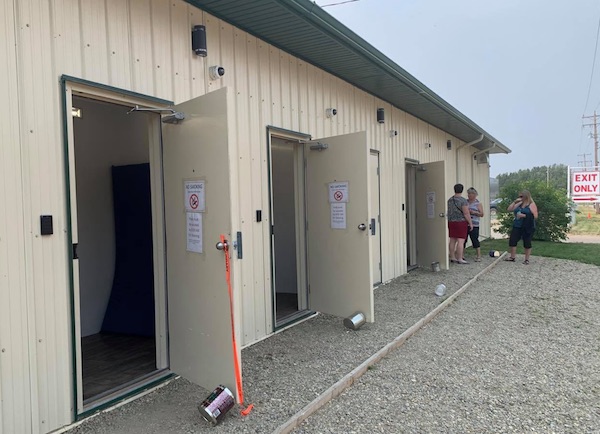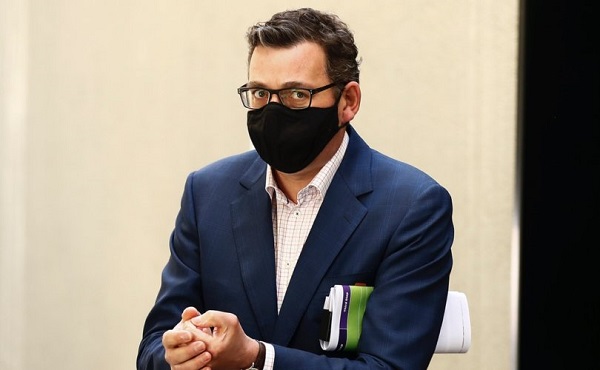Alberta
Town of Edson introduces “ShelterPod” emergency shelters for homeless

Post from the Facebook article by Edson Mayor Kevin Zahara



Alberta
Premier Danielle Smith responds to election of Liberal government

Premier Danielle Smith released the following statement following the re-election of a Liberal government in Ottawa.
I congratulate Prime Minister Mark Carney on his minority government election victory last night.
I also want to sincerely thank Pierre Poilievre for his powerful and principled advocacy against the last decade’s punitive taxation and anti-resource policies that have made our country weaker, more divided and overly-dependent on the United States.
Mr. Poilievre’s vision for a safer, more affordable, united and prosperous Canada drove the policy debate in this country for the last several years and has inspired millions to see the unique potential of our nation. While Liberals and New Democrats demeaned and demonized Albertans, our values and our industries for political gain, Mr. Poilievre made empowering Albertans and our energy sector a cornerstone of his campaign. His respect and admiration for Albertans could not have been clearer. He is and continues to be a true friend of Alberta.
As Premier, I invite the Prime Minister to immediately commence working with our government to reset the relationship between Ottawa and Alberta with meaningful action rather than hollow rhetoric. A large majority of Albertans are deeply frustrated that the same government that overtly attacked our provincial economy almost unabated for the past 10 years has been returned to government.
As Premier, I will not permit the status quo to continue. Albertans are proud Canadians that want this nation to be strong, prosperous, and united, but we will no longer tolerate having our industries threatened and our resources landlocked by Ottawa.
In the weeks and months ahead, Albertans will have an opportunity to discuss our province’s future, assess various options for strengthening and protecting our province against future hostile acts from Ottawa, and to ultimately choose a path forward.
As Premier, I will facilitate and lead this discussion and process with the sincere hope of securing a prosperous future for our province within a united Canada that respects our province’s constitutional rights, facilitates rather than blocks the development and export of our abundant resources, and treats us as a valued and respected partner within confederation.
Our government will be holding a special caucus meeting this Friday to discuss this matter further. I will have more to say after that meeting is concluded.
Alberta
Low oil prices could have big consequences for Alberta’s finances

From the Fraser Institute
By Tegan Hill
Amid the tariff war, the price of West Texas Intermediate oil—a common benchmark—recently dropped below US$60 per barrel. Given every $1 drop in oil prices is an estimated $750 million hit to provincial revenues, if oil prices remain low for long, there could be big implications for Alberta’s budget.
The Smith government already projects a $5.2 billion budget deficit in 2025/26 with continued deficits over the following two years. This year’s deficit is based on oil prices averaging US$68.00 per barrel. While the budget does include a $4 billion “contingency” for unforeseen events, given the economic and fiscal impact of Trump’s tariffs, it could quickly be eaten up.
Budget deficits come with costs for Albertans, who will already pay a projected $600 each in provincial government debt interest in 2025/26. That’s money that could have gone towards health care and education, or even tax relief.
Unfortunately, this is all part of the resource revenue rollercoaster that’s are all too familiar to Albertans.
Resource revenue (including oil and gas royalties) is inherently volatile. In the last 10 years alone, it has been as high as $25.2 billion in 2022/23 and as low as $2.8 billion in 2015/16. The provincial government typically enjoys budget surpluses—and increases government spending—when oil prices and resource revenue is relatively high, but is thrown into deficits when resource revenues inevitably fall.
Fortunately, the Smith government can mitigate this volatility.
The key is limiting the level of resource revenue included in the budget to a set stable amount. Any resource revenue above that stable amount is automatically saved in a rainy-day fund to be withdrawn to maintain that stable amount in the budget during years of relatively low resource revenue. The logic is simple: save during the good times so you can weather the storm during bad times.
Indeed, if the Smith government had created a rainy-day account in 2023, for example, it could have already built up a sizeable fund to help stabilize the budget when resource revenue declines. While the Smith government has deposited some money in the Heritage Fund in recent years, it has not created a dedicated rainy-day account or introduced a similar mechanism to help stabilize provincial finances.
Limiting the amount of resource revenue in the budget, particularly during times of relatively high resource revenue, also tempers demand for higher spending, which is only fiscally sustainable with permanently high resource revenues. In other words, if the government creates a rainy-day account, spending would become more closely align with stable ongoing levels of revenue.
And it’s not too late. To end the boom-bust cycle and finally help stabilize provincial finances, the Smith government should create a rainy-day account.
-

 2025 Federal Election2 days ago
2025 Federal Election2 days agoCanada is squandering the greatest oil opportunity on Earth
-

 International2 days ago
International2 days agoU.S. Army names new long-range hypersonic weapon ‘Dark Eagle’
-

 Alberta5 hours ago
Alberta5 hours agoPremier Danielle Smith responds to election of Liberal government
-

 Autism1 day ago
Autism1 day agoUK plans to test children with gender confusion for autism
-

 COVID-191 day ago
COVID-191 day agoFormer Australian state premier accused of lying about justification for COVID lockdowns
-

 Business1 day ago
Business1 day agoNet Zero by 2050: There is no realistic path to affordable and reliable electricity
-

 Automotive21 hours ago
Automotive21 hours agoMajor automakers push congress to block California’s 2035 EV mandate
-

 Addictions1 day ago
Addictions1 day agoFour new studies show link between heavy cannabis use, serious health risks



